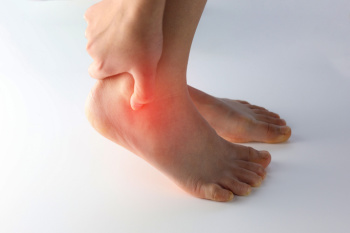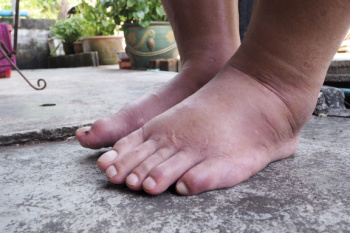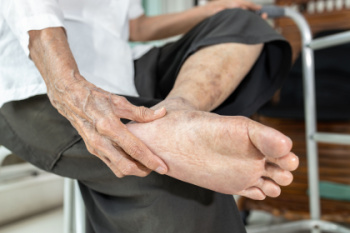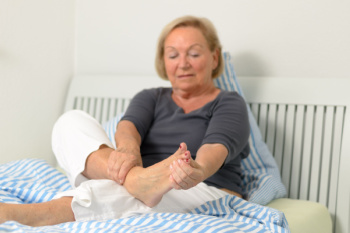NJ (908) 688-5577
NY (212) 737-2528

Tarsal tunnel syndrome, a condition affecting the feet and ankles, arises from compression of the tibial nerve as it passes through the tarsal tunnel, which is a narrow space on the inside of the ankle. Similar to carpal tunnel syndrome in the wrist, this ailment can lead to pain, tingling, and numbness in the affected area. The tibial nerve, responsible for sensory and motor functions of the foot and ankle, becomes compressed due to various factors such as injury, inflammation, or underlying medical conditions like arthritis or diabetes. Individuals with flat feet or those engaging in repetitive activities that stress the foot may also be at higher risk. Symptoms of tarsal tunnel syndrome include burning sensations, electric shock-like pain, and weakness in the foot. Prompt diagnosis and treatment, which often involves rest, can help alleviate symptoms and prevent further complications. If you have pain on the inside of your ankle, it is suggested that you consult a podiatrist who can accurately diagnose and treat tarsal tunnel syndrome.
Tarsal tunnel syndrome can be very uncomfortable to live with. If you are experiencing tarsal tunnel syndrome, contact Glenn Davison, DPM of Advanced Podiatry. Our doctor can provide the care you need to keep you pain-free and on your feet.
Tarsal Tunnel Syndrome
Tarsal tunnel syndrome, which can also be called tibial nerve dysfunction, is an uncommon condition of misfiring peripheral nerves in the foot. The tibial nerve is the peripheral nerve in the leg responsible for sensation and movement of the foot and calf muscles. In tarsal tunnel syndrome, the tibial nerve is damaged, causing problems with movement and feeling in the foot of the affected leg.
Common Cause of Tarsal Tunnel Syndrome
The Effects of Tarsal Tunnel Syndrome
A physical exam of the leg can help identify the presence of tarsal tunnel syndrome. Medical tests, such as a nerve biopsy, are also used to diagnose the condition. Patients may receive physical therapy and prescriptive medication. In extreme cases, some may require surgery.
If you have any questions please feel free to contact our offices located in Union, NJ and New York . We offer the newest diagnostic and treatment technologies for all your foot and ankle needs.

Swollen feet and ankles, a prevalent ailment, can result from various factors. One primary cause is fluid retention, often stemming from prolonged periods of standing or sitting. The body's natural ability to circulate fluids may be compromised, leading to accumulation in the lower extremities. Similarly, injury or trauma can trigger swelling as the body responds to the damage, initiating an inflammatory response. Chronic conditions, such as venous insufficiency or lymphedema, can also contribute to the persistent swelling of feet and ankles. Another key factor is poor circulation, which hampers the efficient movement of blood and fluids, promoting retention in the lower limbs. Additionally, certain medications may induce swelling as a side effect, necessitating attention to dosage and potential alternatives. If your feet and ankles are swollen, it is suggested that you consult a podiatrist who can determine the reason why, and offer effective relief and treatment tips.
Swollen feet can be a sign of an underlying condition. If you have any concerns, contact Glenn Davison, DPM of Advanced Podiatry. Our doctor can provide the care you need to keep you pain-free and on your feet.
Swollen feet are a common ailment among pregnant women and people who stand or sit for extended periods. Aging may increase the possibility of swollen feet and patients who are obese often notice when their feet are swelling too. There may be medical reasons why swollen feet occur:
Swollen feet can also be caused by bone and tendon conditions, including fractures, arthritis, and tendinitis. Additionally, there may be skin and toenail conditions and an infection may cause the feet to swell. Patients who take medicine to treat high blood pressure may be prone to getting swollen feet.
Many patients elevate their feet to help relieve the swelling and this is generally a temporary remedy. When a podiatrist is consulted the reason behind the swelling can be uncovered and subsequently treated.
If you have any questions please feel free to contact our offices located in Union, NJ and New York . We offer the newest diagnostic tools and technology to treat your foot and ankle needs.

Achilles tendon injuries, debilitating and often painful, stem from a variety of causes and risk factors. One primary cause is overuse or repetitive strain, particularly common among athletes engaged in high-impact sports like running or basketball. Sudden increases in training intensity or frequency can also strain the tendon, leading to microtears or inflammation. Additionally, inadequate stretching or warming up before physical activity can increase susceptibility to injury. Foot problems such as flat feet or high arches can further exacerbate the risk of Achilles tendon issues by altering biomechanics and placing uneven stress on the tendon. Tight calf muscles and poor footwear choices, lacking proper support or cushioning, can also contribute to strain on the Achilles tendon. Recognizing these underlying causes and addressing risk factors through proper conditioning, stretching, and footwear selection are essential steps in preventing Achilles tendon injuries and maintaining overall foot health. If you have endured an Achilles tendon injury, it is suggested that you confer with a podiatrist who can successfully treat this condition.
Achilles tendon injuries need immediate attention to avoid future complications. If you have any concerns, contact Glenn Davison, DPM of Advanced Podiatry. Our doctor can provide the care you need to keep you pain-free and on your feet.
What Is the Achilles Tendon?
The Achilles tendon is a tendon that connects the lower leg muscles and calf to the heel of the foot. It is the strongest tendon in the human body and is essential for making movement possible. Because this tendon is such an integral part of the body, any injuries to it can create immense difficulties and should immediately be presented to a doctor.
What Are the Symptoms of an Achilles Tendon Injury?
There are various types of injuries that can affect the Achilles tendon. The two most common injuries are Achilles tendinitis and ruptures of the tendon.
Achilles Tendinitis Symptoms
Rupture Symptoms
Treatment and Prevention
Achilles tendon injuries are diagnosed by a thorough physical evaluation, which can include an MRI. Treatment involves rest, physical therapy, and in some cases, surgery. However, various preventative measures can be taken to avoid these injuries, such as:
If you have any questions please feel free to contact our offices located in Union, NJ and New York . We offer the newest diagnostic tools and technology to treat your foot and ankle needs.

Gout, long considered to affect mostly men, is increasingly recognized as a concern for women as well. In fact, gout can affect anyone, regardless of gender. This painful form of arthritis occurs when uric acid crystals accumulate in the joints, leading to inflammation and intense discomfort. Women may experience gout during menopause, due to hormonal changes that affect uric acid levels. Additionally, lifestyle factors, such as diet, obesity, alcohol consumption, and certain medications, can contribute to gout risk in women. Although women are less likely to develop gout than men, their risk increases with age and other health conditions such as hypertension, diabetes, and kidney disease. Recognizing that gout can affect women is essential for timely diagnosis and management. With proper lifestyle modifications, dietary changes, and medication, women can effectively manage gout and minimize its impact on their quality of life. If you suffer from gout flare-ups, it is suggested that you consult a podiatrist who can assess the situation and help manage the condition.
Gout is a foot condition that requires certain treatment and care. If you are seeking treatment, contact Glenn Davison, DPM from Advanced Podiatry. Our doctor will treat your foot and ankle needs.
What Is Gout?
Gout is a type of arthritis caused by a buildup of uric acid in the bloodstream. It often develops in the foot, especially the big toe area, although it can manifest in other parts of the body as well. Gout can make walking and standing very painful and is especially common in diabetics and the obese.
People typically get gout because of a poor diet. Genetic predisposition is also a factor. The children of parents who have had gout frequently have a chance of developing it themselves.
Gout can easily be identified by redness and inflammation of the big toe and the surrounding areas of the foot. Other symptoms include extreme fatigue, joint pain, and running high fevers. Sometimes corticosteroid drugs can be prescribed to treat gout, but the best way to combat this disease is to get more exercise and eat a better diet.
If you have any questions please feel free to contact our offices located in Union, NJ and New York . We offer the newest diagnostic and treatment technologies for all your foot and ankle needs.